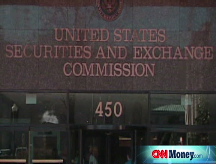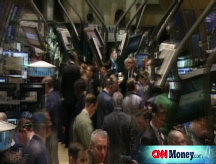The SEC's crusade against shorts is a joke
Even though the temporary ban against short-selling financial stocks has failed to stop the sector's slide, the SEC extended the rule. Huh?

 |
| Shares of banks and insurers got a nice pop the day the short-selling ban was announced. But the S&P Banking Index and S&P Insurance Index have resumed their slides since then. |
NEW YORK (CNNMoney.com) -- Republican presidential candidate John McCain caused some waves last month when he said that if he is elected to the White House, he'd fire SEC chairman Christopher Cox.
McCain certainly didn't go out on a limb with that remark. He picked a very easy target.
In the latest head-scratching move from the Securities and Exchange Commission, the agency announced late Wednesday that it was extending the "temporary" ban on short-selling financial stocks, which was set to expire just before midnight tonight.
I was against the rule when the SEC first proposed it and I find it even more ridiculous that the SEC is extending it for one big reason: it hasn't even worked!
The SEC issued its edict against short-sellers, who borrow stock and sell it with the hopes of buying it back later at a lower price to pocket the difference, on September 19, just days after Lehman Brothers (LEHMQ) filed for bankruptcy and AIG (AIG, Fortune 500) essentially collapsed.
At the time, the SEC said that the action "calls a time-out to aggressive short selling in financial institution stocks, because of the essential link between their stock price and confidence in the institution."
The SEC added that "unbridled short selling is contributing to the recent, sudden price declines in the securities of financial institutions unrelated to true price valuation" and that "financial institutions are particularly vulnerable to this crisis of confidence and panic selling because they depend on the confidence of their trading counterparties in the conduct of their core business."
But guess what? In the past two weeks, despite the ban on short-selling financial stocks, the crisis of confidence has deepened and shares of most financials have fallen even further.
The S&P Banking Index has plunged 11% since September 19, while the S&P Insurance Index has dropped 12%
Washington Mutual's stock kept falling last week even though the SEC did its best MC Hammer and told shorts you can't touch this. WaMu was eventually seized by the FDIC last Thursday and then sold for a dirt cheap price to JPMorgan Chase (JPM, Fortune 500).
And what about Wachovia (WB, Fortune 500)? Shorts had to steer clear of it but the stock still plunged nearly 50% last week, leading Wachovia to get the FDIC to broker a deal for its banking assets in a fire sale to Citigroup (C, Fortune 500) on Monday.
So faced with such overwhelming evidence that the ban has done nothing to stem the brutal slide in financial stocks, the SEC then decides that it's a good idea to extend it? What are they thinking?
The SEC said the ban will now last until no later than October 17. However, if the House follows the Senate and approves a bank bailout bill tomorrow or at some later day, the ban would end on the third day after passage of the bill.
I just don't get it. Yes, there are certainly some short-sellers out there who probably made the financial crisis worse by spreading rumors about some banks.
The SEC, in its statement about the extension of the ban last night, explained its case for the ban even more clearly than it did two weeks ago.
"There are circumstances in which short selling can be used as a tool to mislead the market. For example, short selling can be used in a downward manipulation whereby a manipulator sells the shares of a company short and then spreads lies about a company's negative prospects," the SEC said.
"This kind of manipulative activity is particularly problematic in the midst of a loss in market confidence. For example, in the context of a credit crisis where financial institutions face liquidity challenges, but are otherwise solvent, a decrease in their share price induced by short selling may lead to further credit tightening for these entities, possibly resulting in loss of confidence in these institutions," the SEC added.
This may be true. But shouldn't the SEC more aggressively go after the short sellers that are actually committing fraud instead of banning the entire practice?
The fact that the SEC is resorting to an outright ban is just further proof of how ineffective it has been in dealing with the crisis. It can't find the actual crooks so it's going to just punish everyone that happens to be a short seller.
And it is the SEC that got rid of the uptick rule last year, making it easier for shorts to keep selling a stock while its on its way down. The uptick rule was first adopted in 1938 to prevent bear raids...exactly what the SEC is trying to stop from happening now. Why not bring back the uptick rule?
Finally, the SEC interestingly conceded that short sellers do play an important role in the financial markets by "increasing market liquidity, promoting capital formation, facilitating hedging and other risk management activities."
That last comment is worth thinking about when you consider the mechanics of short selling. If someone shorts a stock, they do have to buy it back someday.
That purchase, in theory, should eventually help boost the price back up, especially if shorts get squeezed, i.e. if they rush to cover their positions and buy back stock they've shorted all at once.
In addition, many investment firms rely on short selling as a hedging technique. And if they no longer have the option to short financial stocks, they probably aren't inclined to buy, or go long, on those stocks either.
So by banning short selling on financials, the SEC may have created an unintended consequence of reducing demand to buy shares.
Investors that might have been interested in purchasing financial stocks have instead decided to sit on the sidelines and wait for the ban to end before wading back in to the sector.
Bravo, SEC on a job well done. ![]()



